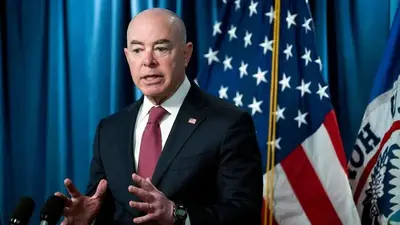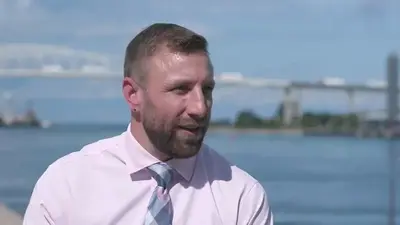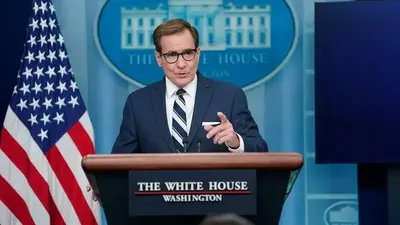Politics
'This Week' Transcript 5-7-23: Treasury Secretary Janet Yellen and Sen. James Lankford
A rush transcript of "This Week with George Stephanopoulos" airing on Sunday, May 7, 2023 on ABC News is below. This copy may not be in its final form, may be updated and may contain minor transcription errors. For previous show transcripts, visit the "This Week" transcript archive.
GEORGE STEPHANOPOULOS, ABC "THIS WEEK" ANCHOR: Thanks to Rebecca for that.
We’re joined now by the Treasury Secretary Janet Yellen.
Madam Secretary, thanks for joining us this morning.
JANET YELLEN, SECRETARY OF THE TREASURY: Thanks.
STEPHANOPOULOS: Let's start out with the timeline now of this – of this possible default. You said earlier this week that you expect that it could come as early as June 1st. I know you get new information every day. Is that still your best estimate?
YELLEN: Yes, early June is when we project that we will run out of cash. And there is a chance it could be as early as June 1st. Of course, there is a lot of uncertainty and I plan to update Congress as new information becomes available. But that’s still our current thinking.
STEPHANOPOULOS: Are there extraordinary measures you can take around that time or is that it?
YELLEN: Well, really that’s it. We have been using extraordinary measures for several months now. And our ability to do that is running out. And we will start to run down our cash and our current projection is that in early June a day will come when we’re unable to pay our bills unless Congress raises the debt ceiling. And it’s something I strongly urge Congress to do.
Of course, it’s appropriate to have negotiations about the budget, about spending priorities. President Biden has presented a detailed budget that does cut deficits by $3 trillion over 10 years while investing in the strength of the American economy. But we do need to raise the debt ceiling to avoid economic calamity.
STEPHANOPOULOS: What – what -- paint a picture for everyone. What happens on that day? Let’s assume for the sake of argument it’s June 1st. What happens that day if the debt limit has not been extended?
YELLEN: Well, Treasury finds itself in the position where we’re unable to pay all of the bills that come due that day. And this would be really the first time in the History of America that we would fail to make payments that are due. And, you know, whether it’s defaulting on interest payments that are due on the debt or payments due for Social Security recipients or to Medicare providers, we would simply not have enough cash to meet all of our obligations. And it’s widely agreed that financial and economic chaos would ensue.
U.S. Treasury securities are the safest bedrock security underlying the global financial system. A failure of the United States to honor all of its debt would call into question our credit worthiness. Even as we get very close to this date, if Congress doesn’t act, we're likely to see financial market consequences.
In 2011 there was a steep decline in the stock market and our borrowing costs back in 2011, the U.S. was downgraded by the credit rating agencies. There would permanently higher borrowing costs for Americans for buying a home, buying a car and a failure to raise the debt ceiling would cause a steep economic downturn.
STEPHANOPOULOS: A question -- the question is what to do about it. Of course, you talked about spending cuts. We’ve now seen 43 Republican senators say they’re not going to extend the debt limit without significant spending cuts and other reforms. Of course, the House passed their bill as well. But the president says he’s not going to negotiate.
So, are we -- is one possibility that you do a side negotiation on spending cuts, the president says it’s not tied to the debt limit, Republicans say it is?
YELLEN: Well, look, I don't want to get ahead of the negotiations that will occur.
President Biden has invited -- invited the leadership of Congress to the White House. So, on Tuesday, I know he wants to set up a process in which spending priorities and levels are discussed in the negotiated.
But these negotiations should not take place with a gun really to the head of the American people because --
(CROSSTALK)
STEPHANOPOULOS: But they are taking place with that gun to the head of the American people.
YELLEN: Well, it’s important for Congress to meet a responsibility. Since 1960, the debt ceiling has been raised 78 times, three times during the prior administration, always with bipartisan support. And it simply is unacceptable for Congress to threaten economic calamity for American households in the global financial system as the cost of raising the debt ceiling and getting agreement on budget priorities.
But, of course, in negotiation, that spending levels and priorities should take place and the president is more than prepared to engage in that negotiation.
STEPHANOPOULOS: Of course, there’s always a chance -- of course, there's always the chance for this kind of negotiations, kind of brinksmanship, that you don't reach a deal and then it comes back to the president.
He said on Friday night that he’s not ready to invoke the Fourteenth Amendment. Of course, the Fourteenth Amendment says that full faith and credit of the United States should not be questioned. And the implications to that would be, if he invoked it, the United States would just continue to issue debt, saying it’s unconstitutional not to.
Now, the president said he’s not ready to do that. But it didn’t seem like he took it off the table. So, is it still a possibility?
YELLEN: Look, you know, our priority is to make sure that Congress does its job. There is no way to protect our financial system and our economy other than Congress doing its job and raising the debt ceiling and enabling us to pay our bills. And we should not get to the point where we need to consider whether the president can go on issuing debt. This would be a constitutional crisis.
STEPHANOPOULOS: But do you -- but is it on the table? Is it something that could be considered? Are you saying -- you just said there’s no way this can be done without Congress. Is that a hard and fast position that the president will under no circumstances invoke the Fourteen Amendment?
YELLEN: Look, all I want to say is that it’s Congress's job to do this. If they fail to do it, we will have an economic and financial catastrophe that will be of our own making and there is no action that President Biden and the U.S. Treasury can take to prevent that catastrophe.
STEPHANOPOULOS: I’m still not exactly clear on whether it’s on the table or off the table. Is it a “break glass in case of emergency” option?
YELLEN: Look, I don't -- I don’t want to consider emergency options. What’s important is the members of Congress recognize what their responsibility is and avert what will surely be regardless of how it’s handled, what option is used to handle it, an economic and financial catastrophe.
STEPHANOPOULOS: It sounds like you’re saying you don't want to, but you may have to.
YELLEN: Well, what to do if Congress fails to meet its responsibility? There are simply no good options and the ones that you’ve listed are among the not good options.
STEPHANOPOULOS: Final question, I want to ask you a question about the banking crisis. We’ve seen three bank failures this year. Two more regional banks appeared to be on the edge.
Do you believe -- still believe that our banking system is strong and resilient? We don't have a systemic problem?
YELLEN: I do believe that. I believe our banking system has strong capital levels and access to liquidity. We have taken decisive action to make sure the difficulties at a few banks don't create contagion that undermines the confidence of depositors in the safety of their deposits and the banking system. And the tools we used previously, we would be prepared to use again if necessary.
But while bank stocks, some bank stocks are under downward pressure, earnings have been under pressure, the banks have access to liquidity and are well-capitalized, and I have confidence in the overall strength of the banking system.
STEPHANOPOULOS: Madam Secretary, thanks for your time this morning.
YELLEN: Thank you.
STEPHANOPOULOS: I want to bring in Oklahoma Senator James Lankford now.
Senator Lankford, thank you for joining us.
I want to start with the debt limit. You heard the secretary there. The president does not want to invoke the 14th Amendment, but she didn’t seem to completely take it off the table. Just said it wasn’t a very good option. What’s your response to that?
SEN JAMES LANKFORD, (R) FINANCE COMMITTEE & (R) OKLAHOMA: Yes, it’s certainly not a good option and she rightfully said it would be a constitutional crisis because the Constitution is very clear that spending -- all those details around spending and money actually has to come through Congress. So I just want to remind everybody, it’s been 96 days since the president set down with the speaker of the House to be able to talk about anything on the debt limit. The debt limit conversation came up the week after the election in November to say this is coming in the – in the coming days. Everyone knew this was coming. And the president’s refused to be able to negotiate about it. That’s been the most stunning part about this is, everyone knew it was coming. It’s time to be able to negotiate it.
And even last week, when the Treasury secretary said, well, now the x day may be June the 1st, the president's response was, well, maybe next week we should get together and talk about this. It should have been the next day that they would actually sit down and be able to talk about it. So we’ve really been very surprised that the president has been unwilling to be able to negotiate and talk about this. And so we’ll –
STEPHANOPOULOS: Well, of course, the –
LANKFORD: We’ll see what he does in the days ahead. But this is between the speaker and the president.
STEPHANOPOULOS: Of course, the Congress – and, of course, the Congress also hadn’t passed a budget. The House only passed their bill days ago. And just yesterday you – the – you 43 senators put out your position saying -- suggesting that there has to be spending cuts and reforms.
It does appear that there seems to be some wiggle room here, that there could be some sort of a deal where you all reach some kind of agreement on some sort of spending cuts. You all say it’s tied to the debt limit. The president says it’s not.
LANKFORD: No, it will be tied to the debt limit because we’ve got to have this conversation. We’re the only country in the world that has a debt limit like this. There’s only two countries that have any kind of debt limit. We’re the only one that has a debt limit like this one. The reason we have it is because it forces a moment to be able to talk about debt and deficit and to say, where are we going on this? Deficits are rising very, very quickly. The American people feel it. We feel it in our economy. It’s entirely reasonable to be able to sit down and say, if we’re continuing to add more and more debt, let's talk about the whole (ph) view (ph). Republicans are (INAUDIBLE) the House and Senate.
STEPHANOPOULOS: But it – but it’s about paying bills you already incurred, isn’t it? It’s about paying bills that the United States has already incurred.
LANKFORD: It is about debt that’s already incurred. It – it – George, it’s about – as you know, it’s about not just debt that’s incurred, but it’s also raising the limit of what we can continue to be able to add on this.
And, again, this is not new. You go back to 2017. Senator Schumer said that the debt limit was leverage for Democrats to be able to negotiate with President Trump. When president – when, at that time, Senator Biden was there under the Bush administration, there were five different debt ceiling votes during that time. He voted for one. He voted no on two of them. And on two of them he didn’t even show up to vote. On the two that he voted no on, he put out a statement saying that the world has changed and that we need to raise taxes at this point. So, he was using that time to raise taxes.
Speaker Pelosi used that leverage with President Trump to increase spreading around the debt limit. So, it seems very odd every time that there's a Republican that’s involved in the debate, suddenly the media talks about, oh, there's going to be this great calamity. We’ve always paid our bills.
But Democrats and Republicans have both used this moment to be able to look at it and say, let's talk about where we're going, what’s the direction, what’s the future? All of the debt limit increases under the Trump administration, none of those were clean. Speaker Pelosi demanded additional spending for every single one of them. So, these are not moments where there’s this, quote/unquote, always clean unless Republicans are negotiating. But Republicans are very united at this point to say, we should look at debt and deficit and to say, what are we going to do to slow down our spending as a government (ph)?
STEPHANOPOULOS: Are you prepared – are you prepared to specify the kind of cuts you’re talking about? Even the House bill doesn’t really specify the cuts.
LANKFORD: Right. Yes, the House bill, as they put out, was their first parameter. It is the beginning of a negotiation to say the House is well prepared and has been prepared to be able to negotiate this. This will be a negotiation between the speaker of the House and between the president. That’s the same as it was during the Trump administration when it was Speaker Pelosi and President Trump negotiating.
So they should sit down – in fact, they should have sat down months ago to be able to talk about this. But, for whatever reason, President Biden has determined that he doesn’t want to negotiate on this and has said it’s got to be clean and has made promises if you’ll – if you’ll do this today, I promise I’ll do something later on, on the budget. That’s just not proved to be true. Joe Manchin can tell you that if the president says I – you know, do this for me today, I'll promise I'll do something later for you, has not worked out for Joe Manchin in what he did -- what happen with the Inflation Reduction Act.
We’ve certainly seen this movie before. It’s time we actually sit down and make a larger plan. The exact same thing that happened under Speaker Pelosi and President Trump when they sat down and negotiated it around a debt ceiling.
STEPHANOPOULOS: What do you expect to happen Tuesday?
LANKFORD: Well, I would hope that they would all sit down and be able to talk about, "OK, what are the parameters? Where are we?" We have $31 trillion in debt. That's happening as a nation. It's continuing to accelerate. We're continuing to see high inflation. We have all the risks of a recession that's out there based on what's happening on government spending and such.
So I would hope they would sit down and say, "What are the areas that we do have common ground on? What are the areas that we can actually begin to reduce spending?"
I don't find a single American, whether they're around government or not around government, that says "The federal government spends every dollar perfectly; there's nowhere in federal spending we can cut; everything's very efficient."
Everyone knows that there's areas of waste in government. We should actually sit down and be able to talk about it and say, "What are the priorities? How are we going to spend on those priorities and to make sure that we're realigning and not just saying what we're spending now we need to just keep spreading and keep adding debt at the rate that we're adding it?"
STEPHANOPOULOS: I want to ask you a political question. President -- former President Trump seems to be strengthening his front-runner status for the Republican nomination right now, in most of the local and national polls. He's leading President Biden in our poll out today. Are you comfortable with the idea of him as your nominee?
LANKFORD: Well, we're going to allow the nominee process to go through. I've not endorsed anyone in this race and not going to for quite a while, if I do it all. I didn't in 2016, either. So I'll stay out of this, as we've got an open seat at this point. Clearly, President Trump is leading in all the polls on it. But it's still early. There are several folks that are unannounced that may announce in the next couple of months. And then the first debates for Republicans will be in August.
STEPHANOPOULOS: Senator Lankford, thanks for your time this morning.
LANKFORD: You bet. Good to see you again, George.
-

 Politics39m ago
Politics39m agoReagan’s great America shining on a hill twisted into Trump’s dark vision of Christian nationalism
-
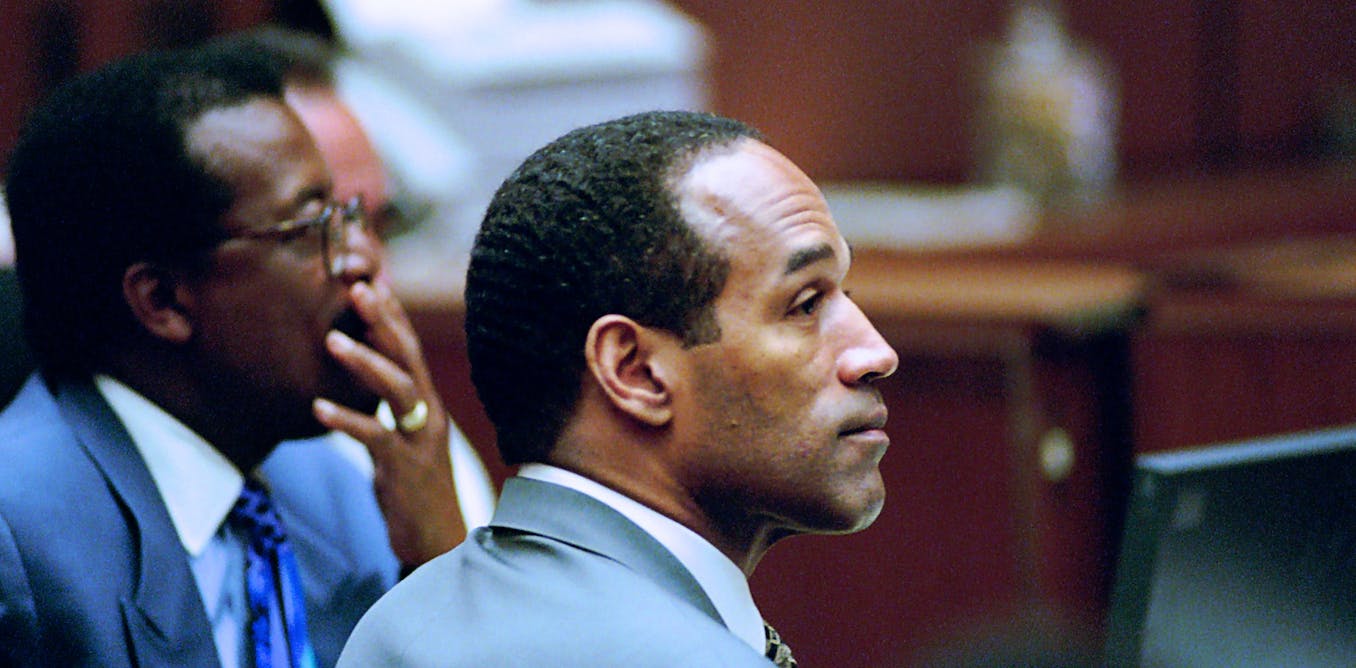
 Politics39m ago
Politics39m ago‘I’m not black, I’m O.J.’: What O.J. Simpson’s life showed about transcending race and being trapped by it
-
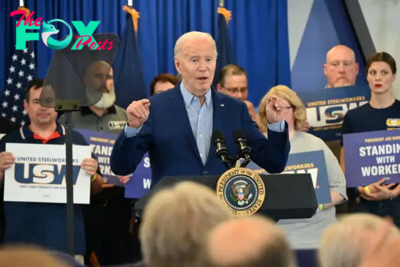
 Politics5h ago
Politics5h agoBiden Calls China ‘Xenophobic’ as He Ramps Up Campaign Rhetoric
-

 Politics7h ago
Politics7h agoCities with Black women police chiefs had less street violence during 2020’s Black Lives Matter protests
-

 Politics7h ago
Politics7h agoSouth Korean President Yoon faces foreign policy challenges after the National Assembly election
-

 Politics13h ago
Politics13h agoWashington Bridge moving to 6 tight lanes – time for good situational awareness
-

 Politics13h ago
Politics13h agoOutdoors in RI: Rainy days and fishing, We the People, customer service, 2A update – Jeff Gross
-

 Politics14h ago
Politics14h agoOther states, like Arizona, could resurrect laws on abortion, LGBTQ+ issues and more that have been lying dormant for more than 100 years
